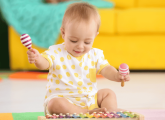Block play can boost children’s development like few other activities, as Charlie Chewter explains…
Block play offers an open-ended, creative and valuable play and learning experience available to every setting.
It offers children freedom – to explore, take apart and put back together any block-based creation they can think of.
There are a host of benefits to be gained from this activity. Here are ten aspects of learning that can expect a boost, many originally highlighted by the National Association for the Education of Young Children:
1. Imagination – Through block play children are free to follow their own ideas as they embark on a voyage of discovery or share in the development of their friends’ creations.
2. Self-expression – Children are able to express themselves through their play, creations and discoveries – a form of communication that’s particularly valuable for bilingual or non-verbal children.
3. Problem-solving – Blocks offer a great platform to develop problem-solving and reasoning skills. This can be deliberate, with children consciously working to develop a solution, or as a natural consequence of play, as they learn first-hand what does and doesn’t work.
4. Mathematics – Due to the many shapes, sizes and colours on offer, blocks offer ample opportunity for children to practise important maths skills, covering measurement, number, symmetry, balance and estimation. By comparing shapes and sizes, creating patterns or providing measuring and weighing tools, we can can extend play and exploration.
5. Physical development – Block play promotes the development of spatial awareness and develops hand-eye coordination as children reach for, lift, move and build with blocks, strengthening their fingers, hands and arms.
6. Creativity – Blocks are loose parts, meaning children are free to combine and re-combine them in countless ways. Add in alternative resources such as dough, small world characters or paint and pencils to further extend opportunities for creativity.
7. Science – Through the exploration of cause and effect and experimentation, children are able to develop their problem-solving skills, test hypotheses and practise scientific reasoning. Blocks help them to become familiar with balance, weight, spatial awareness and gravity.
8. Self-esteem – Children can take risks in their block play, helping them to discover that they have independent ideas. Children experience a sense of achievement as they ‘have a go’, creating and developing something new and unique.
9. PSED (personal, social and emotional development) – Block play allows children to co-construct and negotiate. They take turns, share materials and cooperate with others, forging new friendships. It also encourages self-reliance, increases attention span and develops sense of self.
10. Communication & literacy – As children encounter new experiences through block play, there are countless opportunities for discussion and the development of new vocabulary. Social interaction with adults and peers unlocks further benefits, while using blocks can support story creation and collaborative storytelling.
When observing block play you can support children by identifying and supporting the Characteristics of Effective Learning. Key questions for adults to ask include:
● Are the children having and following their own ideas? Are they choosing and exploring their own ways of doing things?
● Are the children willing to have a go and take risks in their block play? Do they keep trying if things don’t work?
● Are the children involved? Are they concentrating on what they want to achieve?
● Are the children enjoying their play and discoveries? Do they enjoy achieving what they set out to do?
By scaffolding ideas using open-ended questions or making ‘I wonder’ and ‘I notice’ comments to children, block play becomes an exciting environment in which we as practitioners can develop a deeper understanding of a child’s world.
Charlie Chewter is a childcare qualification assessor at PACEY, which is dedicated to supporting everyone working in childcare and early years, providing training, insurance, practical support and expert advice. As a not-for-profit professional association, it offers membership packages for all types of childcare professionals.

Music in EYFS – How to make it meaningful
Editors picks
